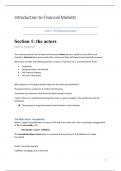Resume
Samenvatting Financial Markets met veel notities
- Établissement
- Universiteit Antwerpen (UA)
Ik heb echt alles genoteerd dat meneer zei. Dus de samenvatting is echt volledig en goed om te studeren, maar zo niet met titeltjes enzo gedaan.
[Montrer plus]



